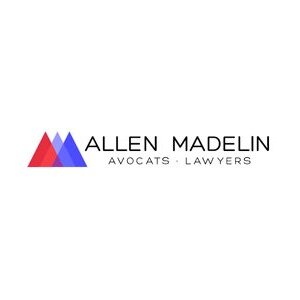Best Renewable & Alternative Energy Lawyers in Montreal
Share your needs with us, get contacted by law firms.
Free. Takes 2 min.
List of the best lawyers in Montreal, Canada
About Renewable & Alternative Energy Law in Montreal, Canada
Renewable and alternative energy law in Montreal covers the legal frameworks and policies guiding the development, implementation, and management of clean energy sources like solar, wind, hydro, biomass, and geothermal power within Quebec. Montreal, as a major city in Quebec, operates under both provincial and federal regulations that encourage the transition from fossil fuels to sustainable energy sources. The legal landscape is shaped by government incentives, environmental standards, permits, land use considerations, and contractual arrangements tied to energy projects. The goal is to ensure environmentally responsible energy production that supports both economic growth and climate commitments.
Why You May Need a Lawyer
Legal assistance in renewable and alternative energy projects is valuable in many situations. Common reasons to seek a lawyer’s help include navigating complex regulations and permits for new energy installations, securing financing and government incentives, addressing zoning or land use concerns, negotiating power purchase agreements, resolving disputes with contractors or government authorities, handling intellectual property matters for new technologies, and ensuring compliance with environmental standards. Additionally, businesses and property owners involved in collaborative projects or joint ventures often need well-structured legal agreements to protect all parties’ interests.
Local Laws Overview
Montreal’s framework for renewable and alternative energy is influenced by federal laws like the Canadian Environmental Protection Act and federal tax incentives, as well as Quebec’s provincial legislation such as the Act Respecting the Régie de l'énergie and the Environment Quality Act. Key local aspects include:
- Permitting and Approvals - Energy projects typically require numerous permits from various levels of government, covering environmental impact, construction, and operation.
- Hydro-Québec Monopoly - Hydro-Québec is a major player in energy generation and distribution, impacting private project approvals and grid connections.
- Incentives and Subsidies - Both the federal and provincial governments may offer grants, loans, and tax credits for eligible projects to encourage clean energy adoption.
- Land Use and Zoning - Energy project siting must comply with municipal regulations on land use, building codes, and sometimes public consultations.
- Environmental Compliance - Projects are subject to environmental assessments to minimize harm and ensure sustainable operation.
Frequently Asked Questions
What is considered renewable or alternative energy in Montreal?
Renewable energy includes sources that are naturally replenished, such as solar, wind, hydroelectric, biomass, and geothermal energy. Alternative energy may refer to any non-fossil fuel power sources, including hydrogen and some forms of waste-to-energy.
Do I need a permit to install solar panels on my property?
Yes, most solar panel installations require permits from the city or borough as well as compliance with building codes, electrical standards, and sometimes Hydro-Québec grid connection approval.
Are there any financial incentives for renewable energy projects in Montreal?
There are various federal and provincial incentives, such as rebates, tax credits, and loans that can help offset the cost of renewable energy projects. Qualifying criteria and funding availability may change, so it is important to check current government programs.
Can businesses sell surplus renewable energy to the grid?
Yes, businesses with eligible renewable energy systems can often sell surplus electricity to Hydro-Québec through net metering or special purchase agreements, subject to technical and legal requirements.
What role does Hydro-Québec play in Montreal's energy market?
Hydro-Québec is the main generator and distributor of electricity in Montreal. It manages the majority of the grid and establishes the terms and access for independent producers who wish to connect and sell energy.
How are land use and zoning regulations relevant to energy projects?
Local zoning and land use regulations determine where renewable energy installations can be located, as well as set standards relating to aesthetics, noise, setbacks, and public consultation requirements.
What environmental regulations affect renewable energy projects?
Projects must comply with provincial and sometimes federal environmental requirements, addressing issues like habitat protection, emissions, and impacts on water and soil. An environmental assessment may be necessary for larger projects.
Do I need to consult neighbors before starting a renewable energy project?
Depending on the scope and location of the project, public consultation or notifying neighbors might be required under municipal bylaws or provincial regulations, especially for larger or more visible installations.
What are the main legal risks in renewable energy deals?
Common risks include unclear or unfavorable contract terms, regulatory non-compliance, environmental liability, disputes over land or rights-of-way, and uncertain access to incentives or permits. Legal guidance can help mitigate these risks.
Can individuals and small businesses collaborate on community energy projects?
Yes, community energy initiatives are encouraged and supported through various programs, but legal expertise is essential to structure the collaboration, address liability, and ensure projects meet all regulatory requirements.
Additional Resources
You might find the following organizations and government resources helpful for further information or support:
- Hydro-Québec - Provincial utility and main grid operator
- Transition énergétique Québec - Provincial energy transition agency
- Ville de Montréal - Municipal permits and bylaw information
- Environment and Climate Change Canada - Federal regulatory and incentive information
- Natural Resources Canada - Clean energy programs and resources
- Canadian Renewable Energy Association - Industry advocacy and best practices
- Équiterre - Local environmental NGO focused on sustainable development
Next Steps
If you believe you need legal assistance with a renewable or alternative energy project in Montreal, consider the following steps:
- Identify the specific needs or concerns relating to your project, such as permits, contracts, or environmental compliance.
- Gather relevant documentation, like property deeds, project plans, correspondence with authorities, or funding applications.
- Consult with a legal professional specializing in energy law within Quebec to get tailored advice.
- Ensure your chosen lawyer has experience dealing with local permits, Hydro-Québec processes, and clean energy regulations.
- Stay informed about changes in government incentives or regulations that could impact your project.
Working with a qualified lawyer can help streamline your project, ensure legal compliance, and protect your investment in renewable and alternative energy.
Lawzana helps you find the best lawyers and law firms in Montreal through a curated and pre-screened list of qualified legal professionals. Our platform offers rankings and detailed profiles of attorneys and law firms, allowing you to compare based on practice areas, including Renewable & Alternative Energy, experience, and client feedback.
Each profile includes a description of the firm's areas of practice, client reviews, team members and partners, year of establishment, spoken languages, office locations, contact information, social media presence, and any published articles or resources. Most firms on our platform speak English and are experienced in both local and international legal matters.
Get a quote from top-rated law firms in Montreal, Canada — quickly, securely, and without unnecessary hassle.
Disclaimer:
The information provided on this page is for general informational purposes only and does not constitute legal advice. While we strive to ensure the accuracy and relevance of the content, legal information may change over time, and interpretations of the law can vary. You should always consult with a qualified legal professional for advice specific to your situation.
We disclaim all liability for actions taken or not taken based on the content of this page. If you believe any information is incorrect or outdated, please contact us, and we will review and update it where appropriate.











